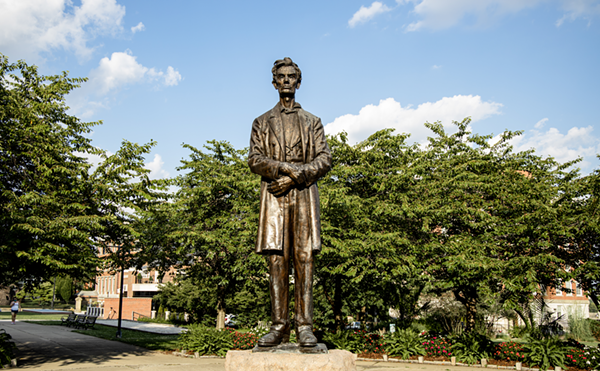
“Millennial voters, who were so instrumental in Barack Obama’s victories, are lukewarm at best about Clinton, even four months after she vanquished Bernie Sanders,” the article said. It also noted that some expressed support for Libertarian candidate Gary Johnson.
Steinem — who comes here on behalf of the newly published paperback edition of her book My Life on the Road — took news of this latest story calmly, even though she’s a Clinton supporter and believes her victory in November would be a historic achievement for women’s rights. She also believes a victory by Donald Trump would be a threat to those same hard-won rights. (A poll released this week shows Trump ahead of Clinton by 5 percentage points in Ohio, with Johnson pulling at 6 percent overall.)
First, she wonders if the story’s anecdotal research includes any minority college students. (It does.) “Right now, there’s the biggest gender gap in history against Trump and for Clinton, and also the biggest race gap,” she says. “So I don’t think it’s fair to say all millennials are one thing.”
But it does raise a question. Why don’t more idealistic younger people, especially young women, see and get excited about the historic importance of Clinton’s candidacy? Could they just be too young to realize the significance?
“Young women and young men have been told they can become anything they want to be, so the barriers they experience will come later,” Steinem, 82, says. “Right now, they may very well understandably think those barriers have been eliminated.
“Women tend to get more radical with age,” she continues. “When we think of the patterns of activism, we think of the mostly male pattern — rebellion comes with youth, and then getting more conservative. But the mostly female pattern is conservatism with youth and then getting more rebellious with age.
“We have the most social value when we are young and potential child bearers, and so on,” she says of women. “We lose power when we replace our mothers. Men gain power as they replace their fathers.”
Were Steinem to go to Ohio college campuses to rally support for Clinton, she wouldn’t argue on the basis of the symbolic importance of her victory. She’d argue on the basis of what Clinton stands for. “It’s the content, not the form,” she says. “If the first woman running for president was Sarah Palin, I wouldn’t be voting for her.”
Steinem would tell Ohio college students that Clinton, like Sanders, stands for a debt-free education. She would also say, for those thinking of voting for an alternative to Clinton or Trump, that “a vote for Johnson in essence is a vote for Trump. Third parties are very good for adding ideas to the political scene, but often they endanger the more liberal of the candidates.”
She would tell young women there’s an especially important reason to support Clinton. “If you want your body to belong to yourself and not to the state, Hilary Clinton stands for reproductive freedom. Trump supports the regulation of female bodies by the government.”
Steinem has long been a supporter of reproductive rights as a key to women’s rights, especially in upending the societal patriarchy — the division of power by genders — that she sees as conspiring to hold them back. That’s one reason she believes opposition to abortion rights has remained so persistent, despite the U.S. Supreme Court’s 1973 Roe v. Wade decision.
“The first step in a hierarchy is the controlling of women’s bodies,” she says. “Females are more or less half of the human race and also the biggest source of cheap or unpaid labor, so this issue gets deep resistance.”
Steinem was born in Toledo, one of two daughters of a couple that eventually divorced. After moving to Washington, D.C. to live with her sister, Steinem graduated from Smith College. She became a noted journalist in the 1960s and then an early and outspoken proponent of women’s rights. In 1972, she founded Ms., one of the most influential magazines of the modern era. She has continued to travel, write, lecture and organize on behalf of progressive causes ever since.
In the book, she recounts how one place that especially moved her during travels is the Great Serpent Mound in southwest Ohio, a 1,330-foot-long effigy mound built by a long-ago indigenous culture, possibly for astronomical purposes. Steinem believes it communicates a spiritual feeling.
“Spirituality feels different from religion,” she says. “It tells us of an essence of God in all living things. Religion creates a hierarchy — God is a man, therefore man is God and woman is less than that. Religions are profoundly political; spirituality is way more unifying.”
Steinem has always believed the world to be a welcoming rather than hostile place. That, however, doesn’t mean she accepts everything she’s told or seen. “It’s very important to be skeptical, because that allows us to use our time better,” she says. “But to be pessimistic is to be defeated at the beginning.”
That positivity has propelled her to enjoy her life of travel. “I believe in the value of meditation,” she says. “I’ve taken two courses, but never managed to make it part of my life.
“Being on the road is my form of meditation. The road is partly a state of mind, a way of living in the present. And living in the present is the only time where we can be fully alive.”
GLORIA STEINEM will discuss My Life on the Road at 7 p.m. Monday at the School for Creative & Performing Arts in Over-the-Rhine. Tickets are $21.40 and include a signed copy of the paperback. More info/tickets: josephbeth.com.





